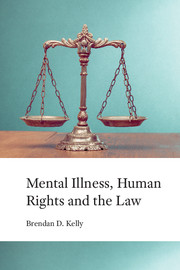Book contents
- Frontmatter
- Contents
- Foreword
- Preface
- Acknowledgements
- List of boxes
- List of legislation, treaties and conventions
- List of cases
- 1 Human rights and mental illness
- 2 Mental Health Acts 1983 and 2007: England and Wales
- 3 Fusing mental health and capacity legislation: Northern Ireland
- 4 Mental Health Act 2001: Ireland
- 5 The challenges of reform: Scotland
- 6 Structural violence, power and mental illness
- 7 Conclusions: fighting for rights
- Notes
- References
- Index
6 - Structural violence, power and mental illness
Published online by Cambridge University Press: 01 January 2018
- Frontmatter
- Contents
- Foreword
- Preface
- Acknowledgements
- List of boxes
- List of legislation, treaties and conventions
- List of cases
- 1 Human rights and mental illness
- 2 Mental Health Acts 1983 and 2007: England and Wales
- 3 Fusing mental health and capacity legislation: Northern Ireland
- 4 Mental Health Act 2001: Ireland
- 5 The challenges of reform: Scotland
- 6 Structural violence, power and mental illness
- 7 Conclusions: fighting for rights
- Notes
- References
- Index
Summary
The preceding four chapters in this book have examined the extent to which mental health legislation in England and Wales (Chapter 2), Northern Ireland (Chapter 3), Ireland (Chapter 4) and Scotland (Chapter 5) protect and promote human rights, and how processes of reform in each jurisdiction shed light on different ways of using mental health legislation to advance the rights of people with mental illness.
This chapter returns more explicitly to broader themes explored in Chapter 1, which examined the relationship between human rights and mental illness. It considers the relevance of the European Convention on Human Rights (ECHR) (which has arguably produced the greatest shift in thinking in this area to date), as well as the UN Principles for the Protection of Persons with Mental Illness and the Improvement of Mental Health Care (United Nations, 1991) and Convention on the Rights of Persons with Disabilities (CRPD) (United Nations, 2006), especially in relation to economic and social rights, and avoidance of discrimination and stigma.
It is, in particular, the CRPD's expansive vision of rights that informs the approach of this chapter and the following one. Indeed, continued improvement of mental health legislation is clearly necessary to protect and promote certain rights of the mentally ill, and current legislation increasingly does so quite well in areas of traditional concern (i.e. involuntary detention and treatment), at least in certain jurisdictions (Kelly, 2011). As a result, the greatest progress is now likely to be made by focusing on mechanisms other than mental health legislation for protecting and promoting other rights that are often infringed among people with mental illness, such as economic and social rights, and assuring access to an adequate standard of care for voluntary and involuntary patients.
The CRPD is especially strong on this point, requiring signatory states ‘to promote, protect and ensure the full and equal enjoyment of all human rights and fundamental freedoms by all persons with disabilities, and to promote respect for their inherent dignity’ (Article 1). This requirement for strong, assertive action to promote rights (and not just avoid impinging them) permeates the entire CRPD, and provides patients, advocates and carers with a fresh and solid basis for more assertive action for the protection of rights not only in the legal sphere, but also in the realms of social advocacy and political activism.
- Type
- Chapter
- Information
- Mental Illness, Human Rights and the Law , pp. 171 - 201Publisher: Royal College of PsychiatristsPrint publication year: 2016



